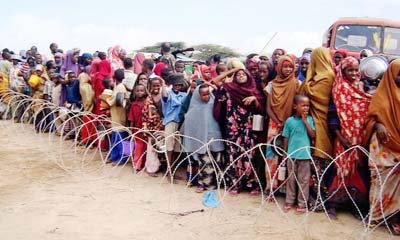
AFP, Nairobi :Over 38,000 Somali children are at “high risk” from dying from starvation despite hunger levels improving by almost a third across the war-torn nation, UN experts said on Thursday.The grim assessment, based on the latest data collected by the UN, comes just over three years since intense drought and war sparked famine in the Horn of Africa nation, killing more than a quarter of a million people.In total, over 731,000 people, including 203,000 children who are severely malnourished, face “acute food insecurity”, according to a joint report released by the UN’s Food Security and Nutrition Analysis Unit (FSNAU) and the US-funded Famine Early Warning Systems Network (FEWS NET).But the total number affected is a drop of 29 per cent from last assessments covering the past six months, with “relatively good rains” in late 2014 helping farmers.”Many children remain acutely malnourished, despite a small decrease in their numbers over the past six months,” the statement read.”An estimated 202,600 children under the age of five are acutely malnourished, including 38,200 who are severely malnourished and face a high risk of morbidity and death. “Three-quarters of those in dire need are those who have fled their homes, mainly due to continued fighting.”Malnutrition rates remain stubbornly high,” UN aid chief for Somalia Philippe Lazzarini said. “The outlook for 2015 is worrisome. “More than 250,000 people, half of them children, died in the devastating 2011 famine.Fighting continues between Somalia’s Al Qaeda-affiliated Shebab rebels and government and allied forces, backed by more than 20,000-strong African Union force.UN special envoy to Somalia Nick Kay said the past year had been “significantly bad” for the Shebab in terms of loss of towns and the killing of their leader by a US drone.But he also voiced concerns international attention had lost its focus on Somalia.Kay, on Thursday in the Ethiopian capital Addis Ababa ahead of a meeting of African Union leaders, said it was “important that we sustain the attention” on Somalia.”It is a concern, especially regarding the humanitarian funding,” Kay said, adding that in 2014 the UN got less than half the necessary aid it needed.

